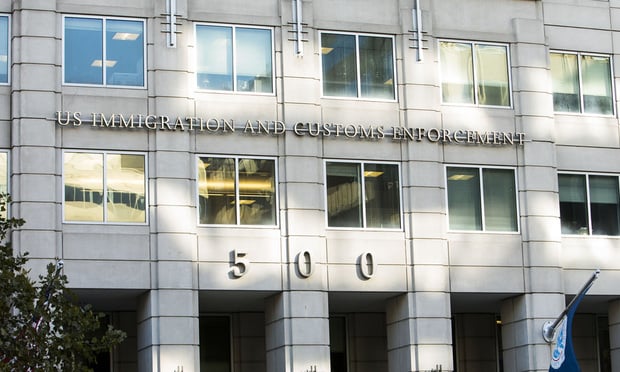NY Federal Judge Presses DOJ Lawyers for Reason Behind 'Public Charge' Rule
Judge George B. Daniels said the new definition aimed to drastically narrow, without congressional approval, who is currently considered a public charge and asked why the administration chose to promulgate the rule.
October 07, 2019 at 01:37 PM
4 minute read
 U.S. Immigration and Customs Enforcement building in Washington, D.C. Photo: Diego M. Radzinschi/ALM
U.S. Immigration and Customs Enforcement building in Washington, D.C. Photo: Diego M. Radzinschi/ALM
A Manhattan federal judge repeatedly pressed a Justice Department lawyer on the rationale behind the Trump administration's proposed "public charge" rule, which is aimed at making it easier for the federal government to deny green cards to immigrants who may rely on public assistance based on their income.
In an aggressive line of questioning, U.S. District Judge George B. Daniels of the Southern District of New York said the proposed rule, set to take effect Oct. 15, sought to impose a new definition that would include noncitizens who are likely to receive some form of public benefits for more than 12 months in a 36-month period.
The district judge said the new definition aimed to drastically narrow, without congressional approval, who is currently considered a public charge and asked why the administration chose to promulgate the rule.
"You gotta give me some rational basis," Daniels said. "The mere receipt of public benefits is not enough on its own to deem somebody a public charge."
Opponents are requesting a preliminary injunction that would bar the rule from going into effect while litigation is ongoing. On Monday, plaintiff attorneys argued that the measure was tinged with "racial animus" and should be reviewed under the daunting strict scrutiny standard because it would disadvantage nonwhite immigrants, while favoring those coming from Europe.
"The outcome is that people who are black, Latino or Asian are more likely to be disproportionately impacted," said Ghita Schwarz, senior staff attorney with the Center for Constitutional Rights.
Attorneys said that the designation of public charge historically has been reserved for individuals who are "predominantly reliant on government aid" for an extended period of time. But under the new rule, immigrants who receive one or more specified public benefits for an aggregate of 12 months during a three-year window would be more likely to be deemed a public charge.
Challengers to the rule argued that immigrants who are deemed a public charge are less likely to be granted legal status to remain in the country under the Immigration and Nationality Act, which was enacted by Congress more than six decades ago.
As a result, the attorneys claimed, immigrants would likely forgo applying for Medicaid, food stamps and housing subsidies, services, the lawyers said, they are entitled to under federal law.
Ethan Davis, the DOJ attorney, said the rule would establish a "totality-of-the-circumstances" test that would weigh multiple factors do determine if someone is likely to become a public charge. Davis acknowledged that the rule would lead to fewer people obtaining green cards, but said the rule was operating within the parameters of Congress' broad definition of "public charge."
Disproportionate impacts on certain groups, he said, were not enough to hold up the rule from going into effect next week.
"The agency is entitled to adopt a reasonable interpretation of broad language," Davis said.
Daniels did not issue a ruling at the end of Monday's hearing, but his chambers said he intended to rule by the end of the week.
Read More:
New Challenge to Trump's 'Public Charge' Immigration Rule Says It 'Weaponizes' Social Safety Net
New York State Leads New Challenge to 'Public Charge' Rule From Trump Administration
US Judge Dismisses Trump Challenge to Subpoena of Tax Returns; 2nd Circuit Gets Immediate Appeal
This content has been archived. It is available through our partners, LexisNexis® and Bloomberg Law.
To view this content, please continue to their sites.
Not a Lexis Subscriber?
Subscribe Now
Not a Bloomberg Law Subscriber?
Subscribe Now
NOT FOR REPRINT
© 2025 ALM Global, LLC, All Rights Reserved. Request academic re-use from www.copyright.com. All other uses, submit a request to [email protected]. For more information visit Asset & Logo Licensing.
You Might Like
View All
Five Years After Vega Much Remains Unsettled in Pay Frequency Litigation

Spotify GC Steps Down, Opts to 'Step Away From Full-Time Corporate Life'
2 minute read
Dechert Sues Former Attorney For Not Returning Compensation

Trending Stories
- 1Bill Would Consolidate Antitrust Enforcement Under DOJ
- 2Cornell Tech Expands Law, Technology and Entrepreneurship Masters of Law Program to Part Time Format
- 3Divided Eighth Circuit Sides With GE's Timely Removal of Indemnification Action to Federal Court
- 4Former U.S. Dept. of Education Attorney Suspended for Failure to Complete CLE Credits
- 5ArentFox Schiff Adds Global Complex Litigation Partner in Los Angeles
Who Got The Work
J. Brugh Lower of Gibbons has entered an appearance for industrial equipment supplier Devco Corporation in a pending trademark infringement lawsuit. The suit, accusing the defendant of selling knock-off Graco products, was filed Dec. 18 in New Jersey District Court by Rivkin Radler on behalf of Graco Inc. and Graco Minnesota. The case, assigned to U.S. District Judge Zahid N. Quraishi, is 3:24-cv-11294, Graco Inc. et al v. Devco Corporation.
Who Got The Work
Rebecca Maller-Stein and Kent A. Yalowitz of Arnold & Porter Kaye Scholer have entered their appearances for Hanaco Venture Capital and its executives, Lior Prosor and David Frankel, in a pending securities lawsuit. The action, filed on Dec. 24 in New York Southern District Court by Zell, Aron & Co. on behalf of Goldeneye Advisors, accuses the defendants of negligently and fraudulently managing the plaintiff's $1 million investment. The case, assigned to U.S. District Judge Vernon S. Broderick, is 1:24-cv-09918, Goldeneye Advisors, LLC v. Hanaco Venture Capital, Ltd. et al.
Who Got The Work
Attorneys from A&O Shearman has stepped in as defense counsel for Toronto-Dominion Bank and other defendants in a pending securities class action. The suit, filed Dec. 11 in New York Southern District Court by Bleichmar Fonti & Auld, accuses the defendants of concealing the bank's 'pervasive' deficiencies in regards to its compliance with the Bank Secrecy Act and the quality of its anti-money laundering controls. The case, assigned to U.S. District Judge Arun Subramanian, is 1:24-cv-09445, Gonzalez v. The Toronto-Dominion Bank et al.
Who Got The Work
Crown Castle International, a Pennsylvania company providing shared communications infrastructure, has turned to Luke D. Wolf of Gordon Rees Scully Mansukhani to fend off a pending breach-of-contract lawsuit. The court action, filed Nov. 25 in Michigan Eastern District Court by Hooper Hathaway PC on behalf of The Town Residences LLC, accuses Crown Castle of failing to transfer approximately $30,000 in utility payments from T-Mobile in breach of a roof-top lease and assignment agreement. The case, assigned to U.S. District Judge Susan K. Declercq, is 2:24-cv-13131, The Town Residences LLC v. T-Mobile US, Inc. et al.
Who Got The Work
Wilfred P. Coronato and Daniel M. Schwartz of McCarter & English have stepped in as defense counsel to Electrolux Home Products Inc. in a pending product liability lawsuit. The court action, filed Nov. 26 in New York Eastern District Court by Poulos Lopiccolo PC and Nagel Rice LLP on behalf of David Stern, alleges that the defendant's refrigerators’ drawers and shelving repeatedly break and fall apart within months after purchase. The case, assigned to U.S. District Judge Joan M. Azrack, is 2:24-cv-08204, Stern v. Electrolux Home Products, Inc.
Featured Firms
Law Offices of Gary Martin Hays & Associates, P.C.
(470) 294-1674
Law Offices of Mark E. Salomone
(857) 444-6468
Smith & Hassler
(713) 739-1250






